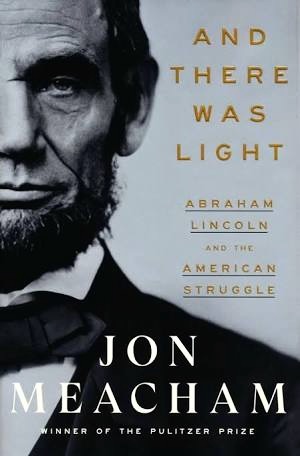I’m reading the perfect book for Americans right now from one of my favorite Historians, Jon Meachem, whose new book, There Was Light: Abraham Lincoln And The American Struggle, just came out.
I’m a couple of hundred pages into it and hooked on it. It’s beautifully written, thoroughly researched, and about as timely a book as any historian could get for us in 2022, the era of Donald Trump and the politics of hate and grievance.
It’s hard for me to grasp that both men called themselves Republicans and saw themselves as moral guardians of the nation. The big difference is that Lincoln was anything but a hater and, from childhood, was nearly obsessed with doing the just and moral thing.
As Meachem details, Lincoln worked all his life on becoming a moral politician who would stay humble and work to figure out what the right thing to do was. The politician in him opposed slavery but was reluctant to say so. When push came to shove, and blood was turning the country red, he made the right call and risked everything.
He was always a very pragmatic and savvy politician. He was never an ideologue. He never stooped to hate and lies. He never blamed others for his or our troubles.
In time, he came to believe that the moral fabric of America depended on abolishing slavery, which he eventually decided to risk his political life to do. Once he made his decision, he was all in and put the American experience’s future on the line. Hatred, bigotry, and slavery, he said, were incompatible with the workings of a democracy and the idea of equality for all.
After that, he never wavered or looked back. Reading him, I am always in awe of the moral compass inside of him.
In Lincoln’s time, believe it or not, the country was even more bitterly divided than it is now, and those divisions led to the bloodiest war in American history. Curiously, it’s a very familiar story – urban versus rural, North versus South, wealth versus poverty, a paralyzed political system, and intractable opponents who labeled one another and gave up on dialogue, compromise, or negotiation.
Then as now, race bitterly tore the fabric of the country apart. We have never been able to come to a common purpose about it, as Lincoln came to insist that slavery, not politics, was ultimately what the Civil War was really about.
You’ll recognize us in this right away. It’s true; nothing is new in politics, and Lincoln was a brilliant politician.
The difference between then and now is that it’s difficult to find political leaders who put morality ahead of money, survival, and power. That’s what keeps popping up as I read the book. Both sides always seem to think each has a lock on morality.
As I do, Lincoln believed that truth and morality will always win. That is an enduring lesson of history. I think that is beginning to happen in America.
Lincoln never took power for granted or took himself too seriously. He was fond of a famous metaphor about how Americans structure their lives. It tells how we spend our whole lives climbing the ladder to get to the top, only to realize we’re climbing the wrong wall.
There is never as much at the top as we think there is. I made it almost to the top and then fell off the wall. I’ll never try to climb that wall again.
Lincoln grasped – it took him a lifetime – that his soul and the country’s soul were at stake in the struggle of his time. I feel the same way about what is happening now. It tests our souls and calls us to a moral basis for our behavior.
I feel Lincoln’s lesson is that the spiritual life is all about trying to do the right thing, not the easy thing, the wealthiest thing, or the most powerful thing.
I’m almost halfway through, and I highly recommend Meacham’s book. I love books from accomplished historians; I read them all.
It’s really about us as much as it is about him. Abraham Lincoln is a pretty worthy role model and guidepost.

